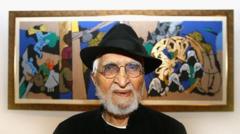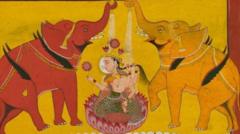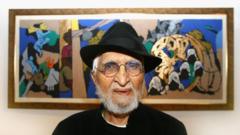A recent ruling by a Delhi court has ordered the seizure of two paintings by the late renowned artist MF Husain, stirring fresh concerns about artistic freedom in India. The court's decision, announced on Monday, follows a complaint citing the works as "offensive" due to their portrayal of Hindu deities, thus igniting a heated debate over the limits of artistic expression and religious sensitivities.
The paintings in question, recently part of an exhibition titled "Husain: The Timeless Modernist" at the Delhi Art Gallery (DAG), featured the Hindu gods Ganesha and Hanuman alongside nude female figures. These illustrations have historically drawn controversy, positioning Husain as a polarizing figure due to his bold representations of religious themes.
The complainant, lawyer Amita Sachdeva, reported the artworks after photographing them during the exhibition. Following her complaint, the police investigated the matter, leading to the court's directive allowing for the seizure of the paintings. DAG has publicly stated that it is not involved in the legal proceedings and is reviewing its position regarding the matter.
Husain, who passed away in 2011, was often labeled the "Picasso of India" but faced significant backlash for his daring depictions. This includes a notable instance in 2006 when Husain was compelled to apologize for a depiction of a nude version of Mother India, triggering his subsequent self-imposed exile due to threats from conservative factions.
The legal ruling arrives amid a broader discussion about artistic expression in India, where topics around obscenity, religious sentiments, and governmental censorship frequently collide. In 2008, India's Supreme Court took a stance against censoring Husain’s work, remarking that nudity is prevalent in Indian culture and that not all artistic nudity is obscene. This current case appears to reflect ongoing tensions regarding the balance between respecting cultural beliefs and protecting the right to creative expression.
Additionally, an earlier ruling by the Bombay High Court highlighted similar challenges by condemning the customs department's seizure of artworks from other renowned artists, asserting that not all nudity or sexually explicit art qualifies as obscene. As discussions continue on this sensitive subject, many within the artistic community fear that this ruling may signal a concerning shift toward stricter controls over creative expressions in India.
As this situation evolves, stakeholders in the art world, legal experts, and advocates for freedom of expression are closely monitoring the impact of these developments on India's vibrant cultural landscape.






















